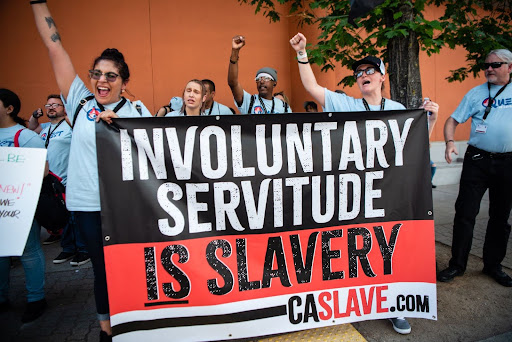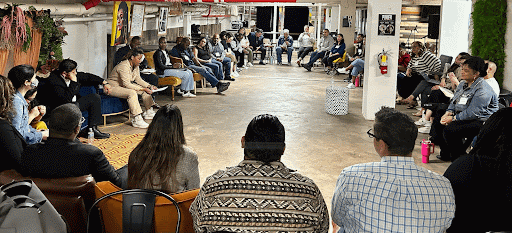Why We Can't Build a Fire-Resilient Future without Worker Justice
Navigating the threat of wildfire is an ongoing reality of life in Sonoma County. From 2017 to 2020, fires burned more than 300,000 acres across the county, resulting in devastating losses to ecosystems, homes, communities, and human lives. Recent years of extreme wildfire events have transformed the land and shifted the priorities of the public, management agencies, and local governing bodies around the essential need for fire adaptation and mitigation.
In Sonoma County, where over half the land area is forest and woodlands, there has been a strong focus on vegetation management. This set of practices, such as thinning, grazing, clearing along evacuation routes, and prescribed burning, alters vegetation to reduce wildfire risk, promote public safety, and support healthy ecosystems. Vegetation management is important in light of decades of extractive land use patterns and fire suppression that have disrupted or altogether eliminated natural disturbance regimes. The removal of fire from California’s landscapes is inextricably tied to colonization and the criminalization of traditional fire stewardship practiced by Native communities for thousands of years.
With catastrophic and unnaturally intense wildfires increasing in frequency over the last few years, tens of millions of dollars are flowing in from the federal, state, and county levels as well as private funds for vegetation management, fire safe education, and local capacity-building efforts. We need to ensure that these funding mechanisms and grant-making entities center the needs and voices of frontline workers.
A sustainable, long-term vision of resilience cannot be separated from justice for the workers who are leading fire mitigation efforts on the ground.
As the scope and scale of vegetation management increases in the years ahead to respond to climate crisis and drought, the demand for a skilled workforce will continue to grow. In Sonoma County, “landworkers” or “trabajadores de la tierra” from Mexico and Central America are the backbone of the wine and agricultural industries and make up a large percentage of the day-labor workforce. All too often, workers in these sectors face low wages, disrespect, wage theft, and dangerous working conditions.
As landworkers continue to step into an emerging fire mitigation workforce, it’s essential that they be compensated and centralized as leaders whose hard work, heart, and expertise make adaptation possible. This means ensuring that vegetation management funds flowing into the county create just jobs and living-wage career pathways for frontline workers and marginalized communities most directly impacted by the climate crisis.

Photo: The crew circled up one morning to learn about reusing leftover material from forest thinning to reduce erosion, build soil and rehydrate the landscape.
Opportunities to replicate and scale a just workforce pilot project for wildfire resilience
In early 2022, North Bay Jobs with Justice (NBJwJ), in partnership with Occidental Arts & Ecology Center (OAEC), piloted a vegetation management and workforce development project. NBJwJ is a growing, grassroots coalition of over 30 labor and community organizations fighting for economic and racial justice on the frontlines of the climate crisis. Over the course of a month, ten farmworkers from NBJwJ completed 41 acres of on-site fuel reduction and mitigation work.
NBJwJ and OAEC seek to model the implementation of vegetation management in a way that effectively mitigates fire risk, and is regenerative and connective both for the workers and the whole of the ecosystem (soil, water, carbon, habitat, biodiverse life). For many of the workers of the pilot project, these holistic concepts were not new, but in fact echoed familiar practices of growing food, healing soil, and tending land that is grounded in their ancestral and Indigenous roots – a testament to the crew’s depth of knowledge and ethic of Earth stewardship that is core to building a more resilient future.
The success of this pilot project led NBJwJ to develop three new programs that are resourced by philanthropy, including the San Francisco Foundation and James Irvine Foundation. The first is a partnership with Santa Rosa Junior College (SRJC) to create a vegetation management and wildfire mitigation workforce development program in 2022. This program integrates workers’ rights, Traditional Ecological Knowledge, and public policy development. Its first cohort of twenty farmworkers and landscapers will receive the training for free and will also receive a stipend to carry out this life-sustaining work. In addition, NBJwJ is partnering with the Tribal EcoRestoration Alliance (TERA) to build connections between the Native, immigrant, and indigenous communities in practice of land stewardship and wildfire mitigation through ongoing field trips and work days. Soon, NBJwJ will be partnering with Fire Forward to offer the first Spanish-language prescribed fire training program.
Funding opportunities in wildfire preparedness and prevention programs like these should invest in the true cost of ecologically-literate vegetation management and well-paid jobs, to do right by the environment and the workers. Catalyzed by philanthropy, this workforce training model serves an innovative, equity-focused, and workers-centered example for communities across California and in the U.S. – in listening to the land and organizing for worker justice to create a sustainable, thriving future.
The need for ecologically literate vegetation management and a trained workforce will undoubtedly grow in the years to come, as communities and governments recognize the need to develop a workforce that is focused on wildfire and landscape resilience. Trabajadores de la tierra, or landworkers, who are on the frontlines of climate change-fueled wildfires, bring their deep knowledge and experience on Earth stewardship in a rapidly changing environment. We believe that this wisdom garnered through work and life experiences as well as generational and ancestral knowledge is critical to confronting the most difficult aspects of climate change. As we organize to improve the quality of current jobs on the land, we are also training workers so they are ready to step into the good, union jobs that we are developing for a more resilient future.
Changing the work on the land benefits us all. Anabel Garcia, a worker leader at one of the trainings, reflected on the stark contrast between her work in promoting forest health to that of working in the vineyards where machines simply clear-cut massive tracts of the forest. Looking around at the carefully thinned understory and woodrat habitat piles built earlier that day, she shared the stories of what is to come: “The community has to think about preserving the soil and the trees. In the future, this is the work that is protecting us.”
Learn more about this innovative workers-centered workforce development program here.
About the Authors
Davida Sotelo Escobedo (they/them), Communications & Research Coordinator, North Bay Jobs with Justice
Davida grew up in the San Joaquin Valley and came to the labor movement in 2017 as a union steward with AFT Local 3544 - GTFF. They have since worked at UNITE HERE International Union and San Francisco Jobs with Justice, always learning from the stories and wisdom of worker leaders. Davida believes in the transformative power of narratives that are rooted in place and in right relationship with the Land. They live in West Sonoma County with their beloved and you can often find them meandering through Oak woodlands or watching the stars.
Hannah Wilton (she/her), Program & Development Associate at the Occidental Arts & Ecology Center
Hannah Wilton (she/her) is a writer, artist and creative strategist based in Sonoma County, California working at the intersections of climate, environmental and social justice movements. Hannah currently works at the Occidental Arts & Ecology Center (OAEC) as a Development and Program Associate where she supports the Center’s fundraising efforts and strategic development of its diverse programs in biocultural restoration and social movement building.
Previous to her work at OAEC, Hannah served as a writer and producer for the Sacred Land Film Project’s Audio Archive and For The Wild podcast where she developed a field series focused on conservation issues and Indigenous land rights across the Pacific Northwest. She also supported For The Wild’s various land-based initiatives, including a campaign to protect and uphold Roadless Rule in Southeast Alaska’s Tongass National Forest to prohibit road construction and commercial logging across 9 million acres of forest.
In 2018, Hannah graduated cum laude from Wesleyan University with a dual degree in American Studies and Environmental Studies. She is dedicated to using storytelling to reimagine ways of thinking and being in service of a more just and ecologically regenerative future.



